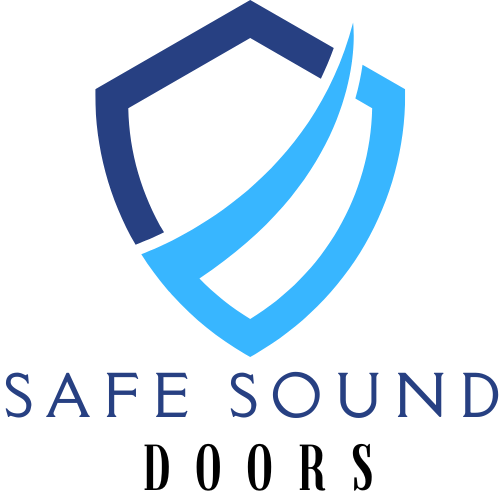Share
Custom Solutions for Restroom Soundproof Doors: Enhance Privacy and Comfort
Estimated Reading Time: 6 minutes

The Importance of Soundproofing Restrooms
Restrooms in both commercial and residential settings are often subject to unwanted noise, whether from plumbing, adjacent rooms, or public spaces. This can impact privacy and comfort, especially in high-traffic areas. Installing custom soundproof doors in restrooms can solve this problem, offering a higher level of privacy and a more comfortable experience for users.
With a well-designed soundproof door, you can block out distractions from the surrounding environment, creating a quiet and private restroom space. Whether it’s for a hotel, office, or home bathroom, soundproof doors offer an essential upgrade for any restroom.
For more about soundproofing and its benefits in commercial spaces, check out this article on Benefits of Soundproof Doors for Commercial Spaces.
Key Features of Custom Soundproof Doors for Restrooms
1. High STC Rating for Noise Isolation
The most important feature of a restroom soundproof door is its ability to block sound. The Sound Transmission Class (STC) rating indicates the door’s ability to reduce sound. For restrooms, an STC rating of 40-45 is generally sufficient to block noise from the outside or neighboring spaces. However, for spaces with higher noise levels, a higher STC rating may be necessary.
To learn more about STC ratings and how to choose the right door, check out this article on STC Ratings Explained.
2. Material and Durability
For soundproofing, solid core doors made from materials such as composite, wood, or metal offer the best performance. These materials help block sound more effectively than hollow core doors. In a restroom, where doors are exposed to high humidity and frequent use, selecting a durable material that resists moisture and wear is key.
Composite doors, which combine multiple materials for superior insulation and strength, are particularly effective in restroom environments, ensuring both soundproofing and long-term durability.
3. Privacy Features
In addition to blocking external noise, custom soundproof doors can be designed with privacy features such as frosted or opaque glass panels. These elements allow light to pass through while preventing visibility, ensuring that users in the restroom enjoy both soundproofing and visual privacy.
Benefits of Soundproof Restroom Doors
1. Enhanced Privacy
Soundproof doors are ideal for maintaining privacy in restrooms. In high-traffic areas like offices, hotels, and shopping malls, it’s essential to prevent sound from leaking into the hallway or adjoining rooms. A high-quality soundproof door ensures that conversations, movements, and other sounds inside the restroom remain private.
2. Improved Comfort
Excessive noise can make using a restroom uncomfortable, especially in public spaces. By installing soundproof doors, you can create a calm and quiet environment where users can feel more at ease. Whether it’s the sound of flushing toilets, running water, or people talking, a soundproof door ensures that users can enjoy a more peaceful and private experience.
3. Better Acoustic Environment
In public restrooms, sound can easily travel from one room to another, creating an uncomfortable and disruptive environment. Soundproof doors reduce this sound transmission, making the restroom more acoustically comfortable and maintaining a better overall experience for users.
For more tips on how to improve acoustics in your commercial space, check out this article: Benefits of Soundproofing for Quiet Spaces.
How to Choose the Right Custom Soundproof Door for Your Restroom
1. Assess the Level of Privacy and Noise Control Needed
Determine how much privacy and noise control is necessary for your restroom. High-traffic public restrooms will require doors with higher STC ratings to block external noise, while smaller or more private restrooms may require less. The location and function of the restroom will dictate the type of soundproof door required.
2. Material Considerations
For a restroom, it’s essential to choose materials that are resistant to moisture and wear. Solid wood or composite materials are ideal for soundproofing and durability. Ensure that the materials are suitable for the humidity levels typically found in restrooms.
3. Consider Design and Aesthetics
Soundproof doors are available in various designs, including options with frosted glass, wood finishes, and modern metallic designs. Choose a door that complements your restroom’s overall design while still providing the necessary soundproofing and privacy features.
4. Professional Installation
Proper installation is essential to ensure that the door provides optimal soundproofing. Ensure that the door is sealed correctly and fitted to prevent sound leakage around the edges. Working with a professional installer can ensure that the door functions as intended and meets all necessary building codes and regulations.
For more information on installation, visit our installation guide.
Conclusion
Custom soundproof doors are the perfect solution for enhancing privacy and comfort in restrooms. By selecting the right materials, STC ratings, and design features, you can create a peaceful and private environment for users. Whether you’re outfitting a public restroom, a hotel bathroom, or a private office restroom, soundproof doors will provide lasting benefits for both comfort and privacy.
Ready to upgrade your restroom with a custom soundproof door? Contact us today to learn more about our range of soundproof doors and get expert advice on the best solution for your space.
